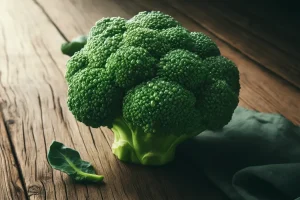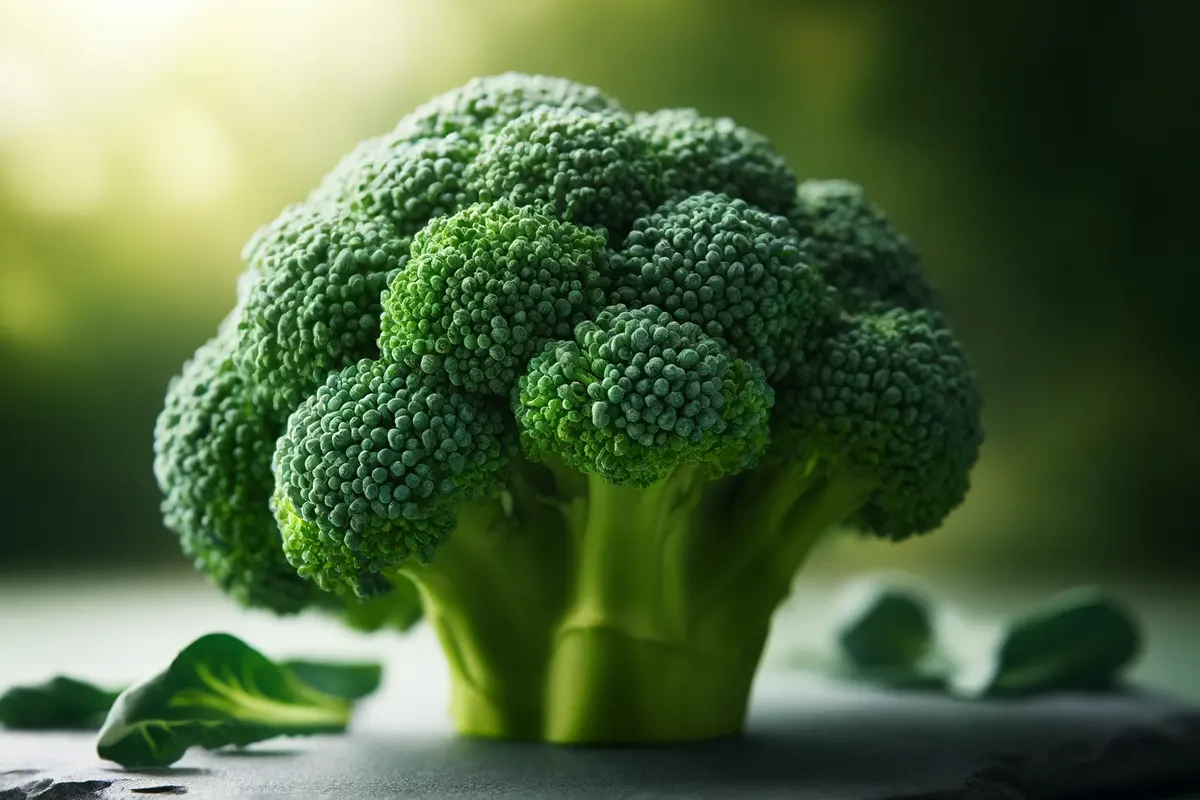Broccoli, often hailed as a nutritional powerhouse, is more than just a green vegetable; it’s a bundle of health benefits waiting to be unleashed in your diet. This versatile veggie, packed with vitamins, minerals, and antioxidants, offers a plethora of health advantages that span from boosting your immune system to protecting against chronic diseases. In this comprehensive exploration of fresh broccoli’s benefits, we’ll dive deep into its nutritional profile, health benefits, and tips for selection and storage. By the end of this article, you’ll see why fresh broccoli stands out as the better choice for your health and well-being.
Introduction to Broccoli
The Nutritional Powerhouse of Broccoli
Broccoli, a cruciferous vegetable, is not just another green on your plate; it’s a nutritionally dense food that packs a punch in terms of health benefits. This green marvel is loaded with essential nutrients that are pivotal for maintaining optimal health.
The Role of Vitamins and Minerals
At the heart of broccoli’s nutritional profile are vitamins A, C, and K, alongside vital minerals like calcium, potassium, and iron. Vitamin C, a robust antioxidant, not only wards off colds but also catapults the production of collagen, ensuring your skin remains as resilient as your immune system. Vitamin A, on the other hand, isn’t just good for your eyes; it’s essential for a healthy immune function and maintaining skin integrity. Let’s not forget vitamin K, which plays a crucial role in blood clotting and bone health. When it comes to minerals, broccoli’s offerings of calcium and potassium contribute significantly to bone density and heart health, respectively.
The Importance of Incorporating Fresh Broccoli into Your Diet
Incorporating fresh broccoli into your diet is akin to giving your body a shield against various ailments. The fiber content not only aids digestion but also ensures you feel full longer, aiding in weight management. But the question remains: Is frozen or fresh broccoli better for soup? While both can be used, fresh broccoli retains a slight edge in flavor and texture, making it a preferable choice for those hearty, healthy soups.
By embracing fresh broccoli, you’re not just adding a delicious green to your meals; you’re enriching your diet with a nutritional powerhouse capable of combating inflammation, supporting heart health, and even warding off cancer. In the forthcoming sections, we’ll delve deeper into these benefits, providing you with all the reasons you need to make fresh broccoli a staple in your diet.
Stay tuned as we explore the manifold nutritional benefits of fresh broccoli in the next part, where we’ll dissect its essential nutrients and the profound impact they have on your health.

Nutritional Benefits of Fresh Broccoli
Diving into the heart of fresh broccoli reveals a treasure trove of nutrients that bolster our well-being. This section peels back the layers to uncover how the essential nutrients and bioactive compounds in broccoli work in concert to enhance our health.
Essential Nutrients in Fresh Broccoli
Vitamins and Minerals Galore
Fresh broccoli is a cornucopia of essential vitamins and minerals, each playing a unique role in our health. Vitamin C, for instance, is not just an immune booster; it’s a potent antioxidant that combats free radicals, reducing oxidative stress. The calcium in broccoli is a boon for bone health, laying the foundation for a sturdy skeletal structure and warding off the specter of osteoporosis. Potassium, meanwhile, keeps the heart beating at a steady rhythm, ensuring blood pressure levels stay in check.
Fiber Content and Digestive Health
The dietary fiber in broccoli is nothing short of a digestive tract ally. It keeps the bowels moving, reducing constipation and maintaining a healthy gut microbiome. This fibrous friend also plays a pivotal role in weight management, making you feel fuller for longer and keeping those pesky cravings at bay.
Antioxidants and Anti-inflammatory Properties
The Role of Glucosinolates and Sulforaphane
Broccoli’s secret weapons against disease are its bioactive compounds, glucosinolates, and sulforaphane. These compounds are like the body’s own personal team of superheroes, fighting off inflammation and neutralizing harmful free radicals. Sulforaphane, in particular, has been shown to have powerful anti-cancer properties, potentially halting the growth of cancerous cells.
Combating Chronic Diseases
The antioxidant and anti-inflammatory properties of broccoli, acknowledged by the global health community, extend beyond cancer prevention, offering broad-spectrum protection against chronic diseases. They extend their protective umbrella over the heart, reducing the risk of cardiovascular diseases. By lowering oxidative stress and inflammation, broccoli helps keep chronic diseases at arm’s length, ensuring our bodies remain resilient against the assaults of aging and environmental factors.
As we wade through the myriad of benefits that fresh broccoli offers, it becomes evident that this green veggie is more than just a side dish. It’s a vital component of a healthful diet, capable of improving our overall health in numerous ways. From its nutrient-dense profile to its disease-fighting capabilities, broccoli stands out as a superior choice for those looking to enhance their dietary habits.
In the next segment, we’ll delve into the profound impact broccoli has on disease prevention, further solidifying its status as a nutritional powerhouse and an indispensable ally in our quest for a healthier life.

Broccoli and Disease Prevention
Broccoli’s role in warding off diseases is akin to a natural form of health insurance, offering protection against a variety of ailments without the side effects associated with conventional medicine. This section delves into the mechanisms through which broccoli contributes to disease prevention, highlighting its impact on cancer, heart health, and more.
Broccoli’s Role in Cancer Prevention
The Mechanism Behind Anti-cancer Properties
Broccoli’s reputation as a cancer-fighting superfood is largely due to its high levels of glucosinolates and sulforaphane. These compounds are like the body’s own personal anti-cancer agents, working tirelessly to safeguard our cells. Sulforaphane, in particular, is a star player in this process. It not only halts the proliferation of cancer cells but also kickstarts the body’s detoxifying enzymes, cleansing the body of potential carcinogens. This dual action makes broccoli a formidable foe against various types of cancer, including those of the breast, prostate, and colon.
Heart Health and Broccoli
Lowering Cholesterol and Improving Cardiovascular Function
The road to a healthy heart is paved with green veggies like broccoli. Its fiber content plays a critical role in reducing cholesterol levels, a key factor in cardiovascular health. But that’s not all. The antioxidants in broccoli go the extra mile, protecting the heart’s blood vessels from damage and ensuring the smooth flow of blood. This combination of cholesterol-lowering fiber and vessel-protecting antioxidants makes broccoli an invaluable ally in maintaining a healthy heart.
Additional Health Benefits
Eye Health and Immune Support
The vitamin A and antioxidants in broccoli don’t just stop at keeping our skin and immune system in tip-top shape; they extend their protective arm over our eyes, too. The high levels of antioxidants, including beta-carotene, protect the eyes from harmful UV radiation and reduce the risk of age-related macular degeneration and cataracts, ensuring our vision remains sharp as a tack.
Bone Health and Weight Management
Broccoli’s benefits extend to our skeletal system as well. The calcium and vitamin K in broccoli are like the dynamic duo of bone health, working together to maintain strong bones and prevent the onset of osteoporosis. And when it comes to keeping those extra pounds at bay, broccoli’s high fiber content comes to the rescue, promoting satiety and aiding in weight management.
Through its comprehensive range of health benefits, broccoli stands out as a green giant in disease prevention. Its unique blend of nutrients and bioactive compounds makes it an invaluable addition to our diet, providing protection against a plethora of health issues. As we move forward, we’ll explore practical tips for selecting and storing fresh broccoli, ensuring you can harness its full potential for your health and well-being.
Choosing and Storing Fresh Broccoli
To reap the full bounty of health benefits broccoli offers, selecting the freshest produce and storing it correctly is crucial. This part of the article guides you through the process of picking the cream of the crop and keeping it in tip-top condition until it’s time to enjoy.
Tips for Selecting Fresh Broccoli
When at the market, your mission is to find broccoli that looks as though it was just plucked from the garden. Fresh broccoli boasts firm, tight florets and a vibrant green color that screams vitality. The stalks should be sturdy and the leaves crisp — a true testament to the vegetable’s freshness. Beware of yellowing florets or limp stalks; they’re telltale signs that the broccoli is past its prime.
Another pro tip: Give the broccoli a sniff. Fresh broccoli should have a clean, earthy scent. Any hint of bitterness or a strong odor is a red flag, indicating it’s time to move on to another bunch.
Best Practices for Storing Broccoli
Once you’ve selected the freshest broccoli, the next step is to ensure it stays fresh until you’re ready to use it. The key to longevity is moisture control. Begin by wrapping your broccoli loosely in a damp paper towel — not too wet, just moist enough to keep it hydrated. Then, place it in an open plastic bag in the crisper drawer of your refrigerator. This setup provides the perfect environment, balancing humidity and airflow to keep your broccoli fresh and crunchy for up to a week.
Avoid washing broccoli before storing it, as excess moisture can hasten spoilage. Instead, rinse it right before you’re ready to cook or eat it. And remember, the sooner you use it, the better it will taste and the more nutrients it will retain.
By following these simple yet effective tips for selecting and storing fresh broccoli, you can ensure that this nutritional powerhouse remains a vibrant and healthful addition to your meals. With your broccoli at its freshest, you’re all set to unlock its full nutritional and flavorful potential in your cooking.
Stay tuned as we move on to addressing some common questions about broccoli in the FAQs section, providing you with all the insights you need to incorporate this green gem into your diet seamlessly.

FAQs on Fresh Broccoli
Broccoli, with its myriad of health benefits, often sparks curiosity and questions about its selection, preparation, and nutritional value. Additionally, here, we address some of the most common queries to help you make the most of this green powerhouse in your daily diet.
Common Questions Answered
Q: How do I know if broccoli is fresh?
A: Fresh broccoli will have firm, tight florets and a vibrant green color. The stalks should feel sturdy, and the leaves (if attached) should be crisp. Avoid broccoli with yellowing florets, limp stalks, or a strong, unpleasant odor.
Q: Can you eat the stems of broccoli?
A: Absolutely! The stems of broccoli are just as nutritious as the florets, packed with fiber and vitamins. Simply peel the outer layer of the stem, which can be tough, and chop the rest to use in stir-fries, soups, or as a crunchy raw snack.
Q: How should broccoli be stored to maintain its freshness?
A: Store broccoli in your refrigerator’s crisper drawer, wrapped loosely in a damp paper towel and placed in an open plastic bag. This setup helps maintain the right balance of humidity and airflow. Avoid washing broccoli before storage to prevent excess moisture, which can lead to spoilage.
Q: Is frozen or fresh broccoli better for soup?
A: While both can be used, fresh broccoli often provides a slightly better texture and flavor in soups. However, frozen broccoli can be a convenient and nutritious alternative, especially when fresh isn’t available.
Q: How long does broccoli last in the fridge?
A: When stored properly, fresh broccoli can last up to a week in the refrigerator. However, for the best flavor and nutritional value, it’s recommended to use it within a few days of purchase.
Q: What’s the best way to cook broccoli to preserve its nutrients?
A: Steaming or stir-frying broccoli are excellent methods to preserve its nutrients, especially its vitamin C content. Overcooking broccoli can lead to nutrient loss, so aim for a tender-crisp texture to retain its health benefits.
By addressing these common questions, we hope to enhance your understanding and appreciation of broccoli. Consequently, we aim to encourage you to incorporate this nutrient-rich vegetable into your meals more frequently. Moreover, with its impressive array of health benefits and versatile culinary uses, broccoli truly is a nutritional powerhouse that deserves a regular spot on your plate.

